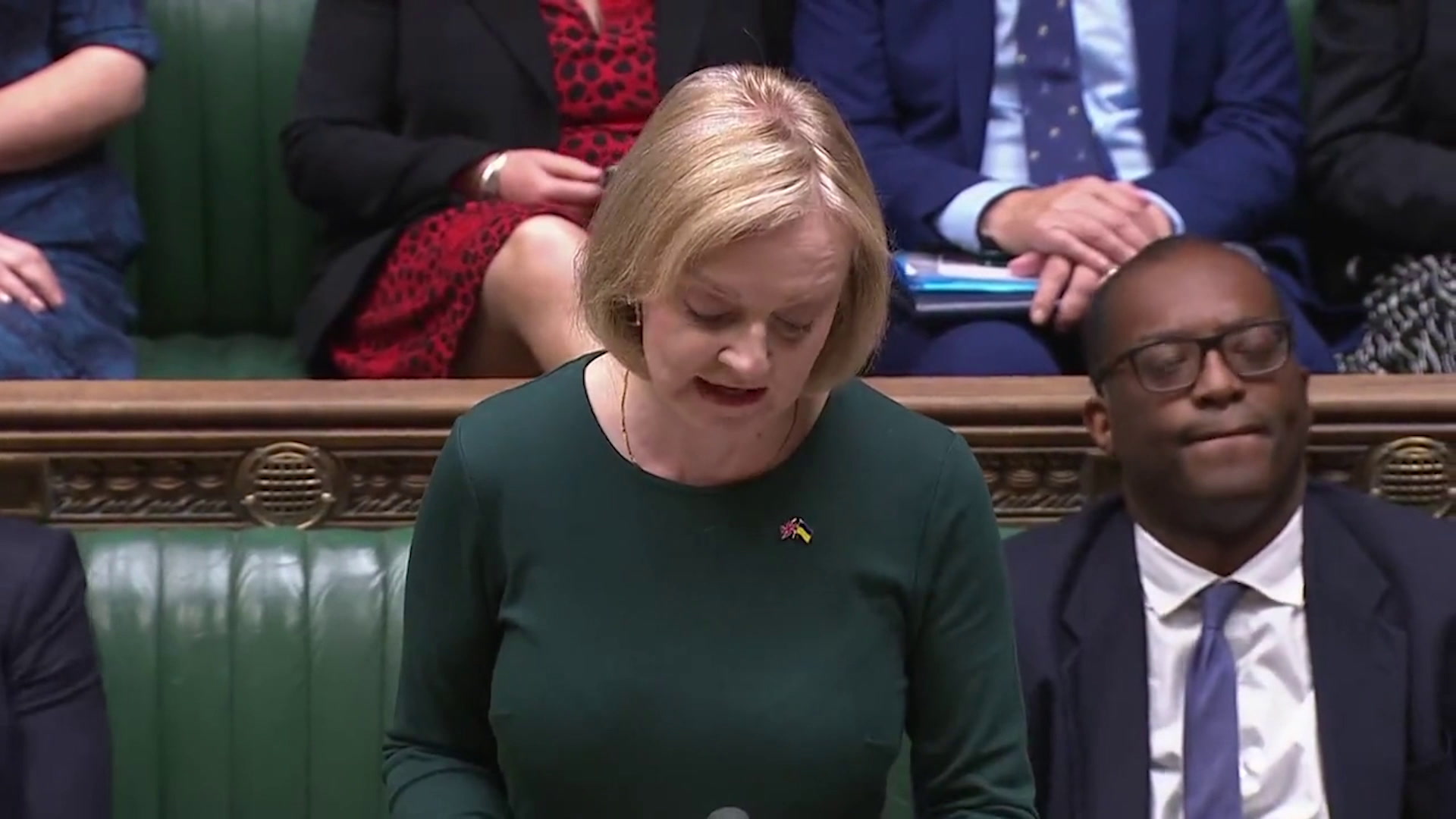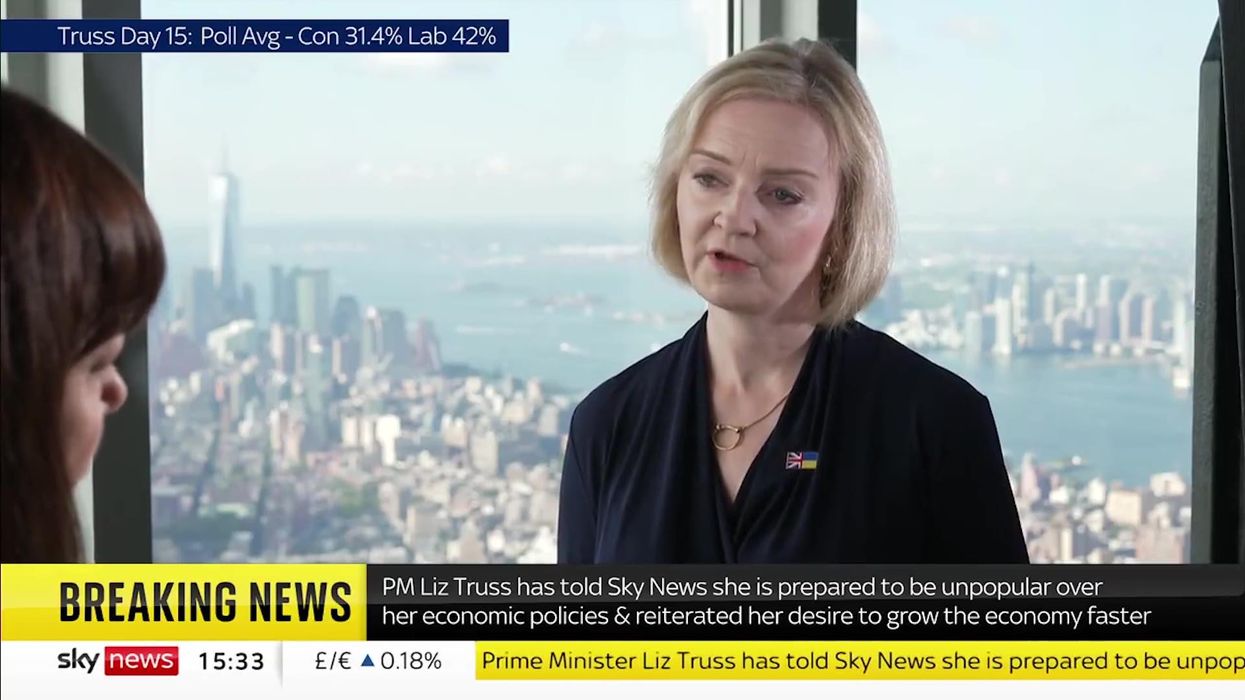Liz Truss has been the PM for a little less than a month now, and it’s been, erm, interesting to say the least.
An awful lot has happened in the time since Truss won the Conservative leadership race with a narrower than expected margin over Rishi Sunak.
Some of it has been beyond her control, with global tensions rising surrounding Russia’s illegal invasion of Ukraine and the death of Queen Elizabeth II overshadowing the past few weeks.
But some of the most controversial moments have definitely been of Truss’s doing.
Sign up for our free Indy100 weekly newsletter
Here are the biggest moments from Truss’s disastrous first month in charge.
September 6 - Protestors hijack her first speech outside Number 10
Things didn’t get off to the easiest of starts for Truss after protesters at Downing Street tried to drown out her first speech as prime minister by playing the song ‘Mad World’ by Tears for Fears.
As she spoke about her vision for the UK and plans to tackle soaring energy bills amid a cost of living crisis, the song could be heard along with air horns during the address.
After heading inside Downing Street, her first act was to appoint Suella Braverman as home secretary, Kwasi Kwarteng as chancellor and James Cleverly as foreign secretary, Therese Coffey as Deputy Prime Minister and Health Secretary.
September 10 - Her curtsy to King Charles becomes a meme
Just a few days into her job the nation was in mourning for the death of Queen Elizabeth II, who died at the age of 96.
As the world paid tribute to the late monarch, Truss became an instant meme on social media after meeting King Charles during the first of his weekly audiences with the PM at Buckingham Palace.
\u201c@imshanereaction @DaleBrogan\u201d— SHANE REACTION (@SHANE REACTION) 1662748887
People found the whole thing very awkward and it wasn’t long before her stilted curtsy was all over the internet – with people imagining her heading a football during the meeting with the new monarch.
\u201cWhat am I? A fucking joke to you people?\u201d— Parody Liz Truss (@Parody Liz Truss) 1662847295
September 8 - Truss announces energy bill plans

Truss announced before the news of the Queen's passing broke that a new set of measures to tackle skyrocketing energy bills would be rolled out.
The measures include a £2,500 price cap for a typical household from October 1 this year and will remain in place for the next two years until 2024.
On average, this will save households around £1,000 a year on future bills in England, Scotland and Wales, while Northern Ireland will receive similar support. A £400 rebate will also go ahead as planned from October.
September 22 – The threat of nuclear war hangs over the west
Vladimir Putin warned he would be prepared to use weapons of mass destruction to “protect” his country in an address to the nation, sparking concern across the West.
An ex-adviser to Putin then claimed UK cities could be a nuclear target for the Russian president and blamed the Ukraine war on the West as he launched into a bizarre rant on British radio.
September 23 - Kwarteng’s mini-budget sends the pound plunging
The biggest talking point from Truss’s few weeks in charge came during Kwasi Kwarteng’s mini-budget, which has been met with widespread derision.
Downing Street has signalled that it will push ahead with its massive package of tax cuts even as the pound plunged to an all-time low against the US dollar amid hammered market confidence in the Government’s economic plans.
Sterling hit its lowest level against the dollar since decimalisation in 1971, falling by more than 4 per cent to just 1.03 dollars in early Asia trading before rebounding to 1.09 dollars on Monday afternoon as speculation mounted over an intervention by the Bank of England, with officials there understood to be considering making an emergency statement this afternoon.
In an unprecedented statement on Monday night, the International Monetary Fund said it was “closely monitoring” developments in the UK and was in touch with the authorities – urging the chancellor to “re-evaluate the tax measures”.
The IMF stated: “Given elevated inflation pressures ... we do not recommend large and untargeted fiscal packages at this juncture, as it is important that fiscal policy does not work at cross purposes to monetary policy.”
September 25 – A damning opinion poll puts Labour ahead
A new poll was released on the first day of Labour’s annual conference in Liverpool, which stated that Sir Keir Starmer could secure a 56-seat majority at the next general election.
The Savanta ComRes survey of more than 6,000 voters put Labour a clear 12 points ahead of the Conservatives, on 45 per cent, with Truss’s party on 33 per cent – the highest poll lead for Labour in more than two decades.
It put the Conservative Party down two points and Labour up three compared with the previous month, with no “Truss bounce” in sight.
September 26 - Truss congratulates Italy’s new far-right PM
\u201cCongratulations to @GiorgiaMeloni on her party's success in the Italian elections.\n\nFrom supporting Ukraine to addressing global economic challenges, the UK and Italy are close allies. \ud83c\uddec\ud83c\udde7\ud83c\uddee\ud83c\uddf9\u201d— Liz Truss (@Liz Truss) 1664219528
Not long after she said the “jury’s out” over whether Macron was a “friend or foe”, Liz Truss sent her congratulations to the far-right leader set to become Italy’s first female premier.
In a message to Giorgia Meloni, whose party the Brothers of Italy is expected to deliver the country’s first far-right-led government since the Second World War, the Prime Minister described the UK and Italy as “close allies”.
September 27 - No confidence letters arrive
Some Tory MPs have already sent letters of no-confidence in Truss’s leadership over fears she will “crash the economy”, a former minister has claimed.
Part of the fallout to the borrowing-fuelled tax cut spree of the previous week, an ex-minister in Boris Johnson’s government told Sky News that the letters which could trigger a confidence have already been sent to 1922 Committee chair Sir Graham Brady.
“Liz is f*****. She is taking on markets and the Bank of England,” the MP told the broadcaster, saying she and Treasury ministers were “playing A-level economics with people’s lives”.
September 27 – Accused of lying to parliament
Truss has been accused of "lying" to a parliamentary committee about what was said during a meeting with the leaders of autocratic Gulf states.
The prime minister, who was previously the foreign secretary, had told the foreign affairs committee that she used the meeting to raise human rights issues with the rulers of Saudi Arabia, Bahrain, and other countries.
But the Foreign Office (FCDO) has repeatedly refused to give any specifics, or even say which countries or issues Ms Truss asked about.
Earlier this year the FCDO rejected a freedom of information request by Gulf human rights activists asking for details of Ms Truss's comments.
It said substantiating her claims could prejudice “the relations between the UK and other states” and “the interests of the UK abroad”.
September 28 – Accused of ‘looking bad on the world stage’
The signs from the public aren’t looking good for Truss, and according to more than half the people who have taken part in a newly published poll the PM does not have what it takes to best represent British interests when dealing with senior international leaders.
More than 52 per cent say they have little or no confidence that the prime minister will perform well on the world stage. Just 6 per cent of the 2,096 British adults questioned by Deltapoll for The National newspaper said they were “very confident” that Truss would be an effective world leader.
Have your say in our news democracy. Click the upvote icon at the top of the page to help raise this article through the indy100 rankings.














